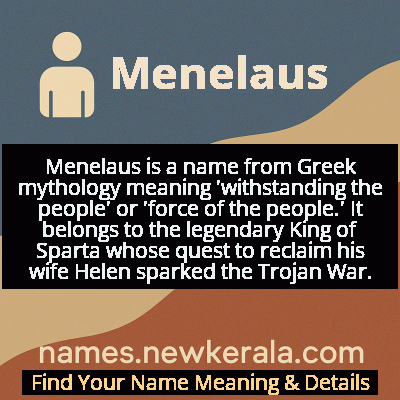Menelaus Name Meaning & Details
Origin, Popularity, Numerology Analysis & Name Meaning of Menelaus
Discover the origin, meaning, and cultural significance of the name MENELAUS. Delve into its historical roots and explore the lasting impact it has had on communities and traditions.
Name
Menelaus
Gender
Male
Origin
Greek
Lucky Number
9
Meaning of the Name - Menelaus
Menelaus is a name from Greek mythology meaning 'withstanding the people' or 'force of the people.' It belongs to the legendary King of Sparta whose quest to reclaim his wife Helen sparked the Trojan War.
Menelaus - Complete Numerology Analysis
Your Numerology Number
Based on Pythagorean Numerology System
Ruling Planet
Mars
Positive Nature
Generous, passionate, energetic, and humanitarian.
Negative Traits
Impulsive, impatient, moody, and can be overly emotional.
Lucky Colours
Red, maroon, scarlet.
Lucky Days
Tuesday.
Lucky Stones
Red coral, garnet.
Harmony Numbers
1, 2, 3, 6.
Best Suited Professions
Military, sports, philanthropy, leadership roles.
What People Like About You
Courage, energy, leadership, generosity.
Famous People Named Menelaus
Menelaus of Alexandria
Mathematician and Astronomer
Pioneered spherical geometry and authored 'Sphaerica', fundamental to ancient astronomy
Menelaus of Aegae
Physician
Influential medical writer whose works were cited by Galen and other ancient physicians
Menelaus (mythological)
King of Sparta
Central figure in the Trojan War whose quest to reclaim Helen defined the epic conflict
Name Variations & International Equivalents
Click on blue names to explore their detailed meanings. Gray names with will be available soon.
Cultural & Historical Significance
Extended Personality Analysis
The mythological Menelaus is characterized by a complex blend of steadfast determination and emotional depth. He demonstrates remarkable perseverance in his ten-year quest to reclaim Helen, showing both strategic patience and unwavering commitment to restoring his honor and kingship. His leadership during the Trojan War reveals a capable military commander who, while driven by personal grievance, also understands the broader political implications of his actions. However, Menelaus also displays significant emotional complexity—his initial rage and desire for vengeance are tempered by moments of mercy and compassion, as when he spares adversaries or shows restraint in victory. His eventual reconciliation with Helen suggests a capacity for forgiveness and emotional maturity that transcends simple archetypes. The character evolves throughout the epic tradition from a somewhat secondary figure to a wise ruler who has navigated betrayal, war, and homecoming with notable wisdom, making him symbolic of resilience and the possibility of restoration after profound personal trauma.
Modern Usage & Popularity
In contemporary naming practices, Menelaus remains an exceptionally rare choice, primarily confined to academic circles, Greek families preserving classical traditions, or enthusiasts of mythological names. The name has not experienced the revival seen with other ancient Greek names like Alexander or Jason, likely due to its strong and specific mythological associations with the Trojan War narrative. Its usage is more common in Greece itself, particularly among families with strong connections to classical education or historical awareness. Outside Greece, the name appears occasionally in literary contexts or among classicists naming their children, but it hasn't gained traction in mainstream Western naming trends. The name's length and distinctive classical sound, combined with its powerful mythological background, make it a bold choice that requires considerable cultural confidence from both namers and bearers.
Symbolic & Spiritual Meanings
Symbolically, Menelaus represents the enduring human themes of perseverance through adversity, the restoration of rightful order, and the complex interplay between personal desire and public duty. His mythological journey embodies the classical concept of nostos—the difficult homecoming after great struggle—making him symbolic of both the physical and spiritual return after trauma. The name evokes the idea of kingship tested and ultimately strengthened by trial, representing the cyclical nature of loss and recovery that defines much of human experience. Menelaus also symbolizes the tension between vengeance and forgiveness, as his initial rage gives way to a more mature reconciliation with both his circumstances and his wife. In a broader metaphorical sense, the name suggests the possibility of restoration and wisdom gained through suffering, making it emblematic of resilience and the capacity to rebuild one's life and authority after profound personal and political challenges.

